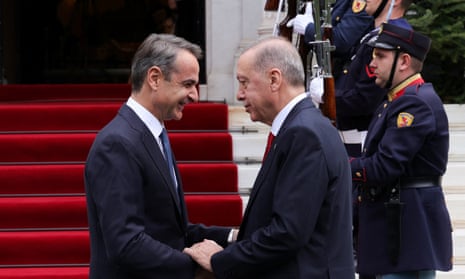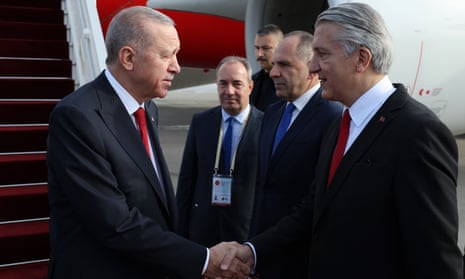Erdoğan plans ‘win-win’ approach in Athens after past feud
Helena Smith
Turkey’s president, Recep Tayyip Erdoğan, will be arriving in Athens today for the first time in six years, determined to move on with a “win-win approach” from the disputes and tensions left by his previous trip to the city.
The last time the Turkish leader visited the Greek capital – exactly six years ago to the day – what had been billed a historic tour descended into a verbal theatre of war as Erdoğan, dispensing with diplomatic niceties, went on the offensive.
Within an hour of stepping off the plane, he had: questioned the treaty delineating the borders between the two neighbours; raised the thorny question of war-split Cyprus; fulminated over the treatment of the Muslim minority in Thrace; and chastised the Greeks for their handling of Ottoman sites, a legacy of 400 years of Ottoman rule.
“We still haven’t forgotten it,” said one well-placed diplomat. “It was as if he was a boxer in the ring, throwing punches from beginning to end.”
From then on, bilateral ties only worsened, with the two Nato rivals nearly going to war over disputed undersea energy resources; Athens accusing its neighbour of “weaponising” migration and Ankara questioning the ownership of outlying Greek islands.
During Thursday’s visit – expected to last barely six hours – the famously unpredictable leader will put pugilism aside.
“We will go to Athens with a win-win approach,” Erdoğan told reporters aboard the presidential plane as he returned from the Cop28 climate summit.
“There, we will discuss both our bilateral relations and Turkey-EU relations in order to make decisions worthy of the spirit of the new era.”
Key events
Better to see ‘glass half full’, Erdoğan tells Greek president

Helena Smith
Turkish president Recep Tayyip Erdoğan’s first meeting with president Katerina Sakellaropoulou appears to have gone well.
Greece’s public broadcaster ERT is reporting that Erdoğan told the Greek head of state that his visit to Athens hailed the start of a new era between the two countries, uneasy neighbours and historic Nato rivals.
“I believe this summit will be an opportunity for a new start in relations between Greece and Turkey,” the leader was quoted as saying.
He added:
Ministers of the two countries will have constructive meetings. We’ll discuss what steps we can take on all issues. Preparations have been made by ministers … I believe it will be better for the future of both sides to speak seeing the glass half full.
Sakellaropoulou said that despite the differences that separate the two nations, it was vital given unfolding events in the region to mend fences.

Here are photos from Athens today, as Erdoğan meets the Greek leadership.


Recep Tayyip Erdoğan has met with Greece’s president, Katerina Sakellaropoulou.

Ruth Michaelson
Looking through the Turkish media, the headlines about Recep Tayyip Erdoğan’s visit to Athens today are not exactly on the front page or homepage of every newspaper.
Even so, the profound shift in his language towards Greece gets a mention in a few places, notably TRT Haber, a division of a state owned channel, which quotes from a recent interview Erdoğan gave to the Greek daily Kathimerini.
Underneath a headline that reads “Erdoğan: Greece is not Turkey’s enemy,” is the mention that both are “valuable members of an alliance,” in reference to NATO.
Never mind, perhaps, that the state-run news agency Anadolu also quoted Erdoğan complaining that the US had provided F16 fighter jets and munitions to Greece while “although we paid for them, F16s are not given to us,” as the US weighs a $20bn sale of the jets and munitions to Ankara that faces opposition in Congress.
“It does not mean we have to back down just because the United States is doing this. We will visit our neighbouring country, sit down, and talk,” he said.
Erdoğan’s repeated mention of a “new page,” in relations and what he labelled the “win-win principle,” all signal a profound turnaround from a prolonged period of public barbs exchanged between him and Greek prime minister Kyriakos Mitsotakis, including Erdoğan mentioning at one point that Turkish-made missiles could reach Athens “if you don’t stay calm.”
TRT Haber now quotes him as saying that this was all simply a misunderstanding, adding that at one point “Western media is trying to distort my words.”
“We are neighbours, we will remain neighbours, we must mutually respect each other’s rights and vital interests. We show how embracing we are when we extend our hand of friendship,” he said.
Asked what he will say to Mitsotakis, a figure where relations deteriorated to the point that Erdoğan once said “Mitsotakis no longer exists,” for him just eighteen months ago, the Turkish president is keen to show that times have rapidly changed.
“I will tell him this: Kiryakos, my friend, unless you threaten us, we do not threaten you. Let’s strengthen the trust between the two countries.”

Erdoğan arrives in Greece

Helena Smith
Turkey’s Recep Tayyip Erdoğan has arrived in Athens.
He is escorted by an entourage so big – at least eight cabinet ministers are travelling with him – two other planes have also flown in with the presidential jet.
Erdogan will head straight to the presidential palace to be greeted by Greece’s head of state Katerina Sakellaropoulou, a judge by profession who has not flinched in the past from expressing views when Turkey is perceived to have crossed ‘red lines’ on national issues. He will then hold talks with Greek prime minister Kyriakos Mitsotakis.
As the bilateral is described as a ‘working’ visit and not an official tour – as was the case exactly six years ago to the day when the Turkish strongman flew into Athens – formalities are expected to be kept to a minimum.
But security measures are draconian – even metro stations have been closed until 6 PM – and the visit appears to be prepared, some would say stage-managed, down to the last detail.
Greek officials say they are braced for “every eventuality” including the famously unpredictable Erdogan crossing a ‘red line.’ The response, they say, is going to be: “Our differences should not produce crises.”
Erdoğan and Mitsotakis are slated to address the media around 1:30 – but will not be accepting questions!

Von der Leyen in China: ‘Differences’ must be addressed
Speaking in Beijing at the EU-China summit, European Commission president Ursula von der Leyen said at a meeting with Chinese leader Xi Jinping and European Council president Charles Michel that the sides will discuss how to rebalance the relationship.
She said:
How we can manage our relationship as well as the significant economic and geopolitical common interests we have matters to both the European Union and China. Because it has a direct impact on the prosperity and security of our people. At times, our interests coincide. When they do not, we need to address and responsibly manage the concerns that we have.
The commission chief also added:
We will discuss how to rebalance our economic relationship. China is the EU’s most important trading partner. But there are clear imbalances and differences that we must address. We both recognise the importance of de-risking and strengthening the resilience of our economies. That is why the European Union is working to ensure the security of its supply chains, critical infrastructure, and technological and industrial bases.
Ahead of his visit to Greece, Turkish president Recep Tayyip Erdoğan has taken a conciliatory tone – while underscoring that disagreements will persist.
Speaking after a cabinet meeting yesterday, he said:
We have had disagreements with Greece, and we will continue to have them tomorrow. This does not mean that we cannot find common ground as two countries that share the same seas.
The Turkish leader added:
Our goal is to improve and strengthen our relations and cooperation with the countries of the region, starting with our neighbors to respect our mutual interests.
Erdoğan plans ‘win-win’ approach in Athens after past feud

Helena Smith
Turkey’s president, Recep Tayyip Erdoğan, will be arriving in Athens today for the first time in six years, determined to move on with a “win-win approach” from the disputes and tensions left by his previous trip to the city.
The last time the Turkish leader visited the Greek capital – exactly six years ago to the day – what had been billed a historic tour descended into a verbal theatre of war as Erdoğan, dispensing with diplomatic niceties, went on the offensive.
Within an hour of stepping off the plane, he had: questioned the treaty delineating the borders between the two neighbours; raised the thorny question of war-split Cyprus; fulminated over the treatment of the Muslim minority in Thrace; and chastised the Greeks for their handling of Ottoman sites, a legacy of 400 years of Ottoman rule.
“We still haven’t forgotten it,” said one well-placed diplomat. “It was as if he was a boxer in the ring, throwing punches from beginning to end.”
From then on, bilateral ties only worsened, with the two Nato rivals nearly going to war over disputed undersea energy resources; Athens accusing its neighbour of “weaponising” migration and Ankara questioning the ownership of outlying Greek islands.
During Thursday’s visit – expected to last barely six hours – the famously unpredictable leader will put pugilism aside.
“We will go to Athens with a win-win approach,” Erdoğan told reporters aboard the presidential plane as he returned from the Cop28 climate summit.
“There, we will discuss both our bilateral relations and Turkey-EU relations in order to make decisions worthy of the spirit of the new era.”
Welcome to the blog
Good morning and welcome back to the Europe blog.
Send comments and tips to [email protected].

